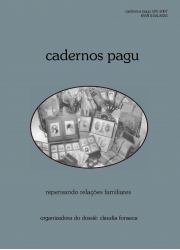Abstract
Os temas centrais desse artigo, reunificação familiar em geral e teste de DNA em particular, surgiram a partir de uma pesquisa em andamento acerca de jovens da Somália na Finlândia. Desde 1996, realizo uma pesquisa etnográfica – em escolas, clubes de jovens, ruas e cafés – com jovens da Somália que chegaram à Finlândia por volta de 1994 e que freqüentam escolas finlandesas nos subúrbios de Helsinki. Meu interesse geral nesta pesquisa longitudinal era conhecer as experiências de passagem para a vida adulta em contextos altamente diferenciados, não apenas do ponto de vista do país anfitrião, mas também cultural e transnacionalmente. O tema, testes de DNA, toca na questão central desta pesquisa de modo profundo. Aqui, crescer não é visto como uma simples questão biológica. É um processo social no qual as relações, como laços de parentesco, são constituídas, vivenciadas e contestadas. Essas relações são poderosas para a identificação individual e social. A testagem-DNA pode violar simbólica e fisicamente o processo social de identificações íntimas e de integridade pessoal.
Abstract
The central themes of this article, family reunification in general, and DNA testing in particular, came to the fore during a research project about young Somalians in Finland. Since 1996, I have been conducting ethnographic research – in schools, youth clubs, streets and cafés – with youngsters from Somalia who arrived in Finland around 1994, and who attend Finnish schools in the suburbs of Helsinki. My general interest in this longitudinal study was to learn about the experiences of coming of age in highly dispersed settings, not only in the vein of a local host country, but also culturally and transnationally. Here, growing up is seen not as a simple biological question. It is a social process in which relationships such as kinship ties are constituted, experienced, and contested. These are powerful relations for individual and social identifications. DNA-testing may both symbolically and physically violate this social process of intimate identifications and personal integrity.
Key Words: Kinship, Identity, Immigration, Family Reunification, DNA Tests
References
BERGLUND, E. Finland as Information Society: An anthropological critique. Suomen Antropologi 4, 2003.
BRYCESON, D. & VUORELA, U. (eds.) Transnational Families in Europe: Global Networks and New Frontiers. London, Berg, 2002.
CARSTEN, J. (ed.) Cultures of Relatedness: New Approaches to the Study of Kinship. Cambridge, Cambridge University Press, 2000.
FASSIN, D. The Biopolitcs of Otherness: Undocumented Foreigners and Racial Discrimination in French Public Debate. Anthropology Today 17/1, 2001.
FONSECA, C. DNA, choice, and destiny in the contemporary Brazilian family. Paper presented in the 7th EASA conference, Copenhagen, 14- 17 August, 2002.
FRANKLIN, S & RAGONÉ, H. (eds.) Reproducing Reproduction: Kinship, Power, and Technological Innovation. Philadelphia, University of Pennsylvania Press, 1998.
HERZFELD, M. Anthropology and the Politics of Significance. Social Analysis 41(3), 1997.
HOWELL, Signe. Self-conscious kinship: Some contested values in Norwegian transnational adoption. In: FRANKLIN, S.; MCKINNON, S.
(eds.) Relative Values: Reconfiguring Kinship Studies. Durham, Duke University Press, 2002.
LEWIS, I.M. The Modern History of Somaliland, from Nation to State.
London, Weidenfeld and Nicolson, 1965.
MALKKI, L. Purity and Exile: Violence, Memory, and National Cosmology Among Hutu Refugees in Tanzania. Chicago, The University of Chicago Press, 1995.
MOORE, S. F. Explaining the present: theoretical dilemmas in processual ethnography. American Ethnologist 14, 1987.
RADIN, J.M. Contested Commodities: The Trouble with Trade in Sex, Children, Body Parts, and Other Things. Cambridge, Harvard University Press, 2001.

